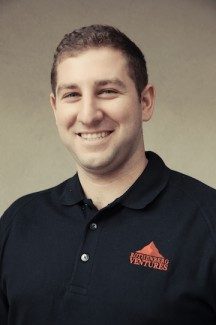Rothenberg Ventures is a venture capital firm located in San Francisco, California. Started in 2012 by Mike Rothenberg, the firm has now invested in over 60 technology companies and was recently part of AltspaceVR’s $5.2 million seed round. Dylan Flinn, investment professional at Rothenberg Ventures, tells me why the VC firm has its sights firmly set on the virtual reality industry.
“I would say ‘Gung Ho’ is an understatement,” Dylan Flinn said when I asked him if this headline accurately represented the company’s stance. Rothenberg Ventures consists of 12 team members and is on its second fund. Some of the company’s previous investments include Patreon, Tile, SpaceX, and Matterport.

Flinn, an investment professional who’s been with Rothenberg Ventures since April 2013, told me that the company sees the VR sector as rife with potential.
“We believe VR is a wide-open world of valuable, transformative, and challenging problems to solve, and there is already a disproportionate number of brilliant technologists working on solving them,” he said. Recently Flinn set about gathering insight on the virtual reality sector by talking with the community that’s shaping the industry.
“Over the last two months, I’ve gained my confidence in VR’s trajectory through conversations with almost 200 developers in the space. We are excited to invest in and help these VR visionaries grow through our community, capital, and operational support,” he told me. “Now is the best time in history to start or join an early-stage technology company… we believe virtual reality will impact virtually every industry and consumer behavior imaginable.”
That’s one of the reasons—virtual reality’s huge potential as not just a product, but a platform—that Rothenberg Ventures joined in on AltspaceVR’s recent $5.2 million seed investment.
See Also: AltspaceVR Seed Investment Tops $5.2 Million, Software Details Revealed Today at SVVR #13
“Many of today’s ‘social’ activities are in fact not, and AltspaceVR is well positioned to build a platform that enables better social experiences across a variety of human behaviors.” Flinn said. “Eric Romo [founder of AltspaceVR] is a visionary who knows how to execute in the short-term. He brilliantly balances what VR may look like in 5-10 years with what needs to happen today and tomorrow.”
After AltspaceVR, Rothenberg Ventures has its sights firmly set on further investment in the growing virtual reality space. Flinn says that the company is very interested in developers creating open and cross-platform experiences.
“It’s important that the key hardware players such as Facebook (Oculus), Sony, and Samsung don’t have a death grip on distribution and discovery, so I’m eager to support the software developers that want to build open networks,” Flinn said. “I’m specifically excited about software that is platform agnostic and can reach customers through multiple stores, platforms, and hardware systems.”
“Software,” Flinn said bluntly when I asked if Rothenberg Ventures was more interested in hardware or software when it comes to the VR sector.
“Like Bill Gates said, ‘content is king.’ Consumers (and enterprises) will adopt the hardware platforms that have the best software experiences,” he elaborated. “That being said, I’m still waiting for someone to build the de facto killer input mechanism that all software developers are eager to adopt. I’m forever grateful of Oculus, Sony, Samsung, and all the bold indie hardware developers enabling the entire ecosystem, but what we need now are amazing applications.”
Venture capital firms like Rothenberg Ventures look for more than just ideas. When I asked about the sought after traits in early-stage companies, Flinn told me that execution is key, alongside clairvoyance in a still-maturing space like VR.
“For VR, we need to see long-term commitment since the market is so nascent. We also need to see that people can get comfortable being uncomfortable. It’s a cliche that building a startup is like being on a roller coaster, so building a startup in VR is like being on a roller coaster with a dozen random screws missing. The most important tangible trait is execution. Founders need to prove that they can build amazing experiences. While it doesn’t have to be polished, we need to be able to tell that this is the foundation of something remarkable.”
“Hope for the best but plan for the worst,” Flinn said when offering advice to entrepreneurs working in the VR space.
“This is bootstrap time. Spend a portion of your time networking and talking to potential investors, but priorities 1–3 should be building amazing consumer ready experiences that take full advantage of what VR hardware is capable of. Look for angels that can help extend your runway to 3-6 months past the consumer launch. That should give you a big enough window to gather data and prove that you deserve a larger investment. Also, give us a call, because we want to help.”
Flinn encourages founders and enthusiasts to reach out directly to Rothenberg Ventures—you can contact him here.
With investments in VR, whether from crowdfunding or VC, happening on a nearly monthly basis, it is clear that the space is increasingly heating up from an investment standpoint.
“I think Rothenberg Ventures’ thesis and attitude are still outliers, but not for much longer,” Flinn said. “The Facebook acquisition helped a lot with that. We can’t just sit back and wait for VR developers to come pitch us, we need to be proactive right now.”






